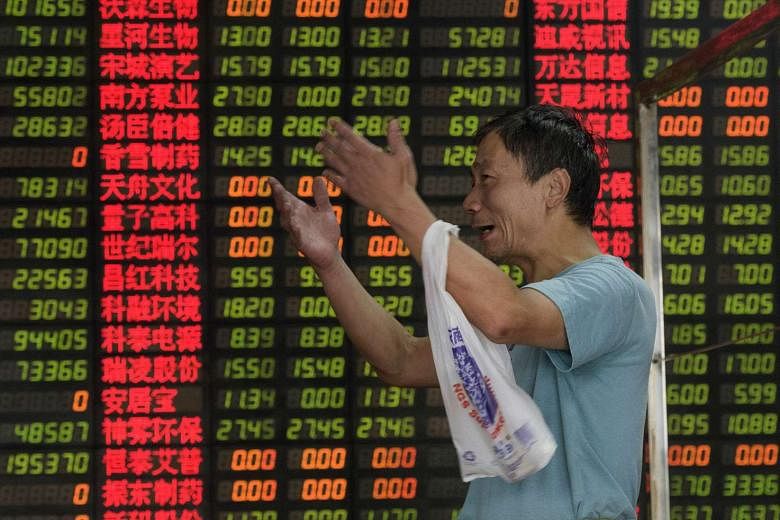BEIJING (REUTERS) - China's financial markets are expected to remain stable and the yuan is not on course for a long-term devaluation, while fiscal spending will grow faster than expected this year, the country's top financial officials told the G20.
Finance Minister Lou Jiwei said that central government spending will rise 10 per cent this year, more than the 7 per cent growth budgeted at the start of the year, according to a statement late Saturday on the People's Bank of China website. China will raise dividend payments from designated state-owned enterprises to make up for any shortfalls.
China is headed for its slowest economic expansion in 25 years in 2015 and mainland markets have slumped 40 per cent since mid-June, sending global financial markets skittering.
Ailing Chinese shares dragged down Hong Kong stocks to their lowest close in two years on Wednesday. China's financial markets were closed on Thursday and Friday to commemorate the 70th anniversary of the end of World War II.
China's overall GDP growth will remain around 7 percent, as predicted earlier in the year, and the new economic normal may last for four to five years, Lou said. The government will not particularly care about quarterly economic fluctuations and maintain steady macro-economic policy, he added.
China can no longer rely on policy supports to achieve 9-10 per cent growth, as it may already take several years to digest excess industrial capacity and inventories, he said.
It will go through "labour pains" in the next five years as it aims to complete main structural reforms by 2020, Lou added.
The quality of growth, however, is already improving with 7 million jobs created in the first half of the year, consumption overtaking investment in contributing to economic growth and the balance of payments becoming more even, he said.
Also at the G20, People's Bank of China Governor Zhou Xiaochuan reviewed the massive run-up and crash of Chinese equities, acknowledging its global impact in August.
Financial leaders from the Group of 20 top economies met in Turkey on Friday and Saturday.
China's efforts, including the central bank channelling liquidity into the market, averted a precipitous slide and systemic risks, Zhou said. Leverage has decreased noticeably and the real economy was not significantly effected.
The yuan-US dollar exchange rate is relatively stable, the stock market is already roughly where it should be and financial markets are expected to be stable, he said.
Earlier G20 officials said the Chinese devaluation of the yuan in August and the stock market plunge were all part of a difficult path to a more liberal economy.

